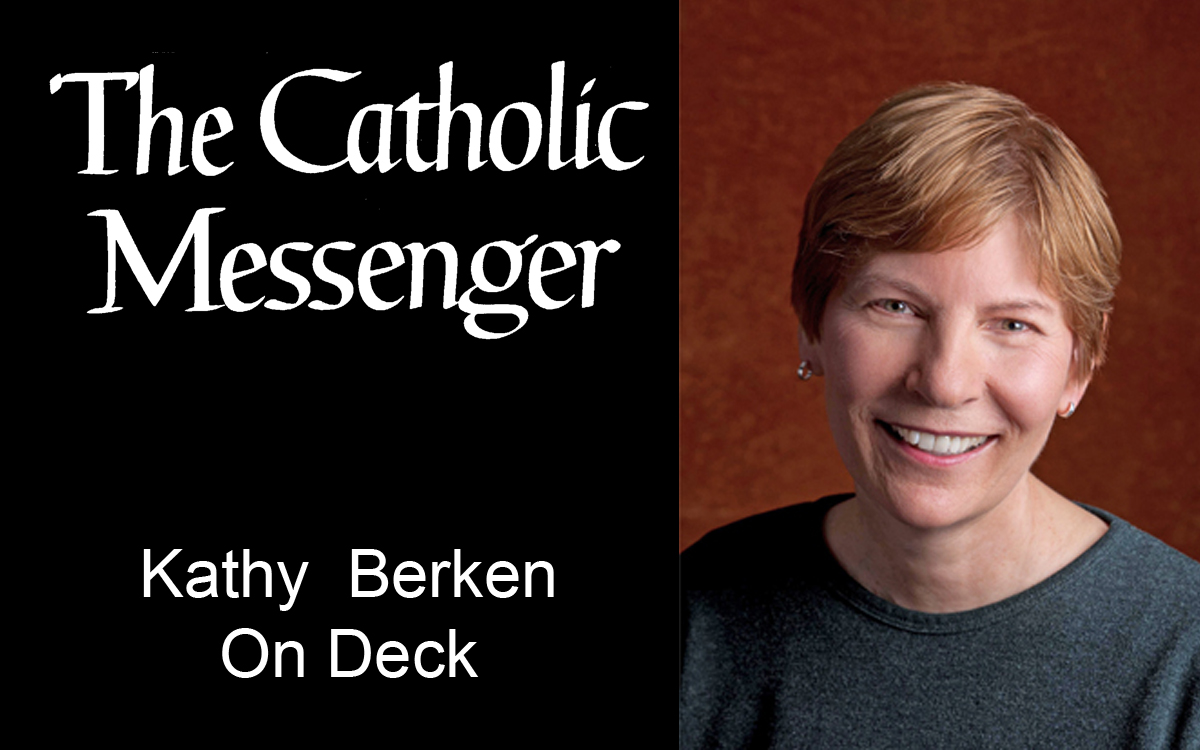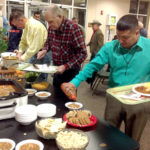By Kathy Berken
In this era of the absence of any regular practice of the sacraments, we may feel that we have lost something so precious that our grief becomes overwhelming. For most of us, Masses have been suspended, and confirmation is postponed. Baptisms, weddings, funerals, and anointings are all strictly limited.
 This is all so surreal! I watch our pastor say Mass online with one reader 20 feet away. My granddaughter’s first Communion is postponed indefinitely, and funerals of friends and family will be held at a later date. We can’t celebrate or grieve properly!
This is all so surreal! I watch our pastor say Mass online with one reader 20 feet away. My granddaughter’s first Communion is postponed indefinitely, and funerals of friends and family will be held at a later date. We can’t celebrate or grieve properly!
Lately, I’ve read social media comments of frustration and anger about not being able to gather as a community for what is the most important part of their lives — experiencing Jesus through meaningful rituals that have always brought us closer to God. And even though bishops have dispensed the faithful from attending weekly Mass, some people still feel left out in the cold and fear for their salvation.
Which brings me to an article by Father Jim Sabak, OFM, “Clericalism and the Pandemic,” (www.praytellblog.com, April 18, 2020). Father Sabak examines the attitudes of clergy during this time of ritual poverty in our churches, and how that filters through to the laity. He specifically points to the role of the priest as the single person who can mediate between us and God through the sacraments. Further, he says that when we rely exclusively on the priest to bring Jesus into our hearts through the Eucharist, reconciliation and anointing when churches are closed, we lose something important. And we also create a kind of unhealthy clericalism.
But let’s be clear. No one wants to change church teaching on the role of clergy. No one thinks that the sacraments are not a great source of spiritual consolation. Father Sabak said that we get off track when we view the priest as the sole dispenser of grace, thus “[betraying] a troubling view of ordained ministry and sacramental ministry.”
This simply becomes a “prohibition on enacting the sacraments” focusing less on their communal nature and more on “the necessary role of clerics as ministers of the sacraments.” This is a “curious form of pandemic clericalism,” he adds, which compels some clergy to tend to the needs of the faithful on their own terms favoring ritual over context.
So, this tells the laity that the only way to God is through the priest, minister-of-the-sacraments, causing some laity to feel spiritually poverty-stricken. This view of the priest being the only person who can open up the door to God, Father Sabak says, veers to cultism, wherein “without the clergy there can be no sacramental experience, and thereby no possibility of salvation.” This, frankly, helps no one.
Is there an alternative? Yes. Father Sabak emphasizes the “role of sacraments in the ‘daily and domestic’ lives of believers.” God is just as present to us in breaking bread with our families as God is present in the Eucharist at Mass. How is this possible? Because God is unchanging; God is everywhere, and God doesn’t decide to enter our lives by degree depending on how we choose to encounter the Divine. The sacraments are by definition a communion of the sacred and the secular, enacted in community to unify the people of God. But when we cannot gather in person, we find other ways to equally experience God’s presence.
We can pray together at home or on Zoom, bless each other with prayer and water, tune in to Mass online, experience God in nature and in giving to others, practice centering prayer alone or with others, be grateful, and pay close attention to how we feel when we experience compassion, love, kindness, generosity, forgiveness or understanding. These are all sacramental rituals where God is fully present. All the time and everywhere.
(Kathy Berken is a spiritual director and retreat leader in St. Paul, Minnesota. She lived and worked at The Arch, L’Arche in Clinton (1999-2009) and is author of “Walking on a Rolling Deck: Life on the Ark (stories from The Arch.)












Love this article Kathy! I especially appreciated, “Because God is unchanging; God is everywhere, and God doesn’t decide to enter our lives by degree depending on how we choose to encounter the Divine. The sacraments are by definition a communion of the sacred and the secular, enacted in community to unify the people of God. But when we cannot gather in person, we find other ways to equally experience God’s presence.”
Good job – and a great reminder to us all.
Virtual and virus-free hugs from Saskatoon SK Canada – Sarah